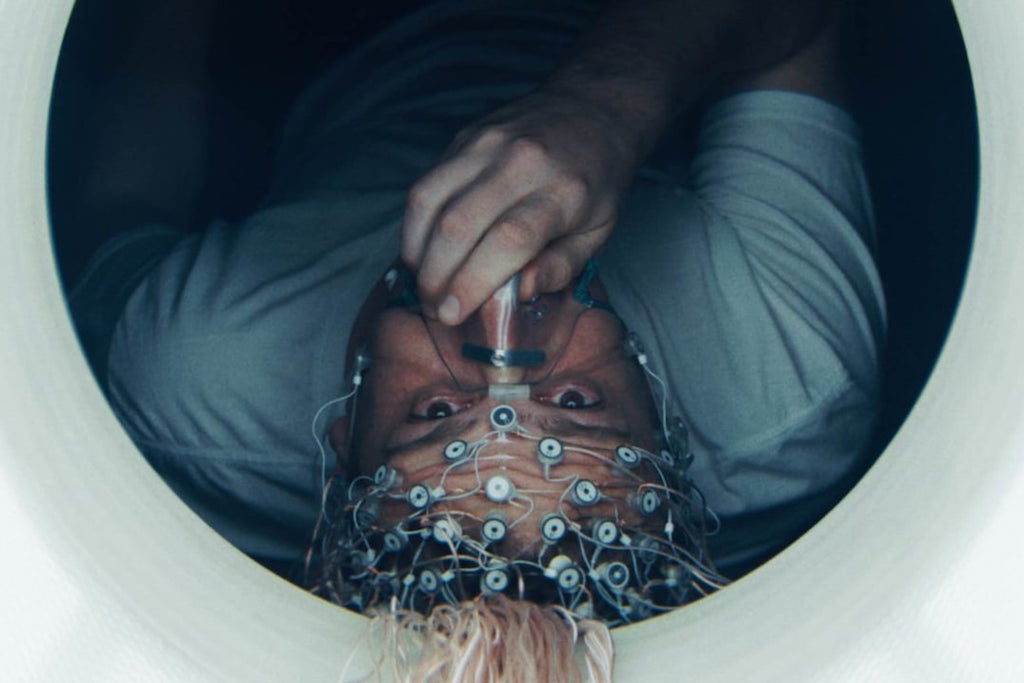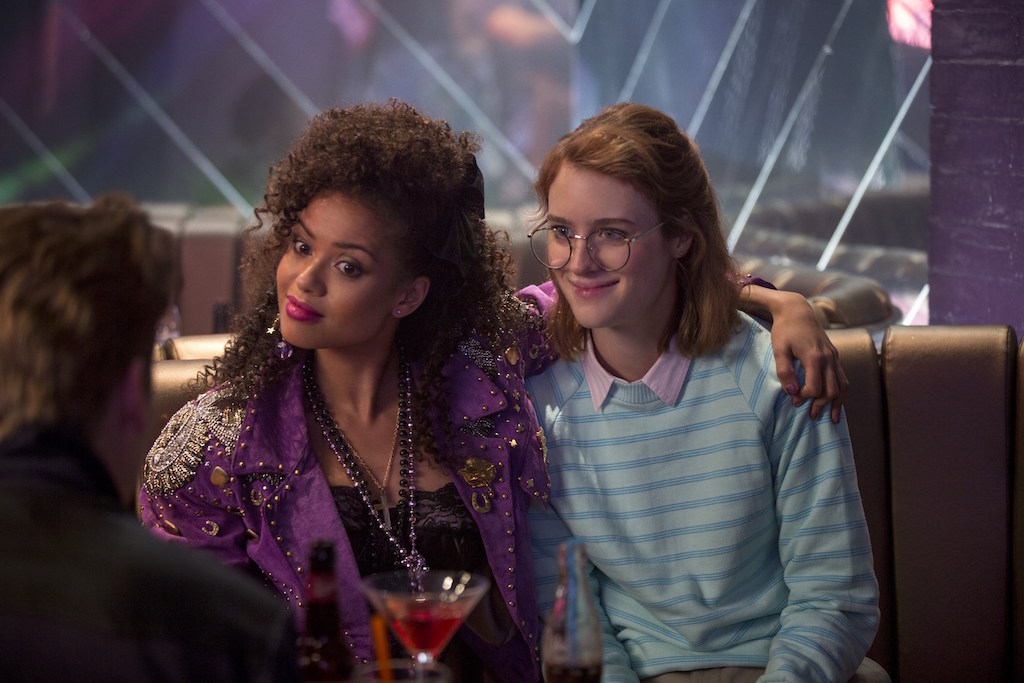‘The Discovery’ Is The Latest Sci-Fi To Mess With Your Head About An Afterlife
Is this new Netflix film more or less depressing than Black Mirror?

This post discusses suicide and depression.
–
No genre is better equipped to deconstruct death than science fiction. Sure, fantasy might seem like the obvious choice for the whole death/afterlife/soul debate, but that’s only because religion and mythology have a few good millennia on characters like Agent Smith and Megatron.
While Lord of the Rings can examine the heartbreak of leaving one life for the next and Chronicles of Narnia can jam a heavy-handed, frankly twisted version of the Christian heaven down our throats, sci-fi is often predicated on the murky relationship between the physical, mental and/or spiritual worlds. Sci-fi texts take a microscope to just where biology ends and the ‘soul’ begins and, if they’re any good, will have us questioning whether we were inside the Inception all along oh god.

Help.
The best part of the new Netflix film The Discovery is that it has its virtual cake and eats it too; the film takes a heavily religious element — the afterlife — and sci-fis the crap out of it. In doing so, it turns science into a twisted replacement for religion, in more ways than one.
It’s A Terrifyingly Technologically-Advancing World, Baby, We Just Live In It!
The Discovery is based around the two-year anniversary of Dr Thomas Harbor (Robert Redford) discovering tangible, empirical evidence for consciousness leaving the body after death. While Harbor is calm, measured and apparently guilt-free, the finding has unfortunately and demonstrably led to an exponential number of people killing themselves, all in the supposed knowledge they’ll get a “fresh start” somewhere else.
Although much of The Discovery questions the ethics of Dr Harbor revealing his research to the world (even though yes obviously he should do that what the hell else is science for?), the film’s most interesting question is, depressingly, more universal: is it worth living in a deeply unfair, painful world, or ditching it for a new life? As Redford’s cranky son Will (the always likeable Jason Segel) asks the suicidal Isla (actual god Rooney Mara), who’s to say we won’t just make the same mistakes in the next one?
While it’s let down by poor gender dynamics and some plot holes, The Discovery largely succeeds in mixing these weighty concepts with touching relationships and, occasionally, bleakly hilarious comedy. The film is interesting, oddly comforting, and — although not entirely satisfying — at the very least different, which goes a long way in a year filled with gritty reboots and pointless adaptations.
Par for the course in sci-fi, The Discovery also has a decidedly pessimistic vision of technology, which is treated as something that humanity simply cannot handle. In Dr Harbor’s world, science has replaced religion as a core justification for global tragedy, inspiration for terrifying cultists, and something for skeptics to be a dick about.
The film grapples with a bunch of interesting, depressing dilemmas following Harbor’s Discovery — from the growing acclimatisation to suicide to discussion on whether the newly-scientific justification for suicide could be applied to murder. Most notably, Will fucking hates it. He thinks that the science is still out on the whole afterlife thing and, at best, far too incomplete to have been released to the public. Though another plane of existence has been discovered, they know nothing about what it looks like.
Questioning our relationship with technology is literally a requisite of sci-fi; it’s in the genre’s goddamn genes/coding/whatever metaphor works here, so the skepticism and luddism is certainly earned. But while Will’s largely justified in his misgivings, he rather shittily finds fault with what’s arguably a best case scenario:
“Three months ago, I had a patient, really young. Found out that she had brain cancer. Very sad.
“She reacted to that diagnosis as if I’d just handed her a fucking winning lottery ticket. And it wasn’t because she hoped that maybe she was going someplace better. It was because The Discovery made her think that it was guaranteed.”
I mean, Will’s just being an ass here. He’s right to hate on research that’s both half-finished and inarguably the cause of mass suicides; that’s Empathy 101. But, like religion, if the research helps a terminally ill person with their diagnosis and, at worst, makes them a little more cavalier with their mortality, isn’t that at least close to the healthiest reaction? As dangerous as the Discovery was for this world, isn’t it possible that humanity could, in time, accept and progress with the science while still appreciating this life?
The film ultimately decides that no, we simply can’t. Even Dr Harbor (a traitor to True Science) sets about destroying his research before the big details of the afterlife can reach the masses. And sure that’s fair and logical in the face of what these people have seen in their world, but the film barely entertains the possibility that people can grow with technology.
Sci-Fi And The Afterlife
The idea that people can research life-after-death or even create their own goddamn afterlife is nothing new for science fiction; from The Matrix’s semi-religious virtual reality, to Lex Luthor’s great-great-grand-whatever becoming the first ‘necronaut’ to journey into the afterlife, to that Johnny-Depp-in-the-cloud film nobody saw. There’s no limit to how much we’re willing to see scientists poke around in places we maybe shouldn’t. And with the rise of VR technology and scientists speculating about mind-uploading, our shared fascination with a cyber-life is only ever going to increase.
The best recent example of this — and one that compliments The Discovery incredibly well — is Black Mirror’s ‘San Junipero,’ the critically-lauded love story in part set in an era-jumping virtual world that, for anyone who wants it, can also act as an afterlife.
On top of being the only episodes of Black Mirror to show an altruistic example of technology, ‘San Junipero’ is effectively the inverse of The Discovery. Where Dr Harbor’s findings are ill-defined and ultimately incomplete, the plane of ‘SJ’ is clearly set out as a human-made world, complete with free-will and even rules (i.e. time limits for living people).
Where Will and co effectively agree that The Discovery is evil, or at best too much for mere humans, ‘San Junipero’ explores a world where technology is a gift made by, and for, inherently kind people. And where Isla is largely passive — and at least twice ‘saved’ by more foregrounded men — the outgoing, dynamic Kelly (Gugu Mbatha-Raw) and shy, repressed Yorkie (Mackenzie Davis) are complicated, proactive and vulnerable characters.
Also, try ever listening to this song without tearing up a bit, go on I goddamn dare you.
Admittedly, as interesting as ‘SJ’ is, its core premise is ultimately a zero-sum game; you either die, as people have since forever, or you die and join a perfect virtual world for as long as you feel like it. The Discovery is instead closer thematically to Legion, The Matrix and Inception, where its second life isn’t so much a perfect virtual dream world than an ethically-ambiguous plane to be rejected, destroyed or accepted.
In portraying characters that struggle with, and to various degrees conquer, a complicated afterlife, The Discovery succeeds in spite of its representation of science/religion as poisonous. As pessimistic as it might look compared to something like ‘San Junipero’, the film still finds a kindness through characters shaped by severe adversity.
Its final twists suggests humanity will change for the better simply because we are built to evolve… Not in our relationship with technology, though. That, the film decides, will basically always be fucked.
–
You can reach Lifeline 24 hours a day on 13 11 14.
–
The Discovery is on Netflix now.
–
Chris Woods is a Melbourne-based freelance journalist, the Editor-in-Chief of The Tech Street Journal, and proud author of a Scum piece he wrote two years back.
